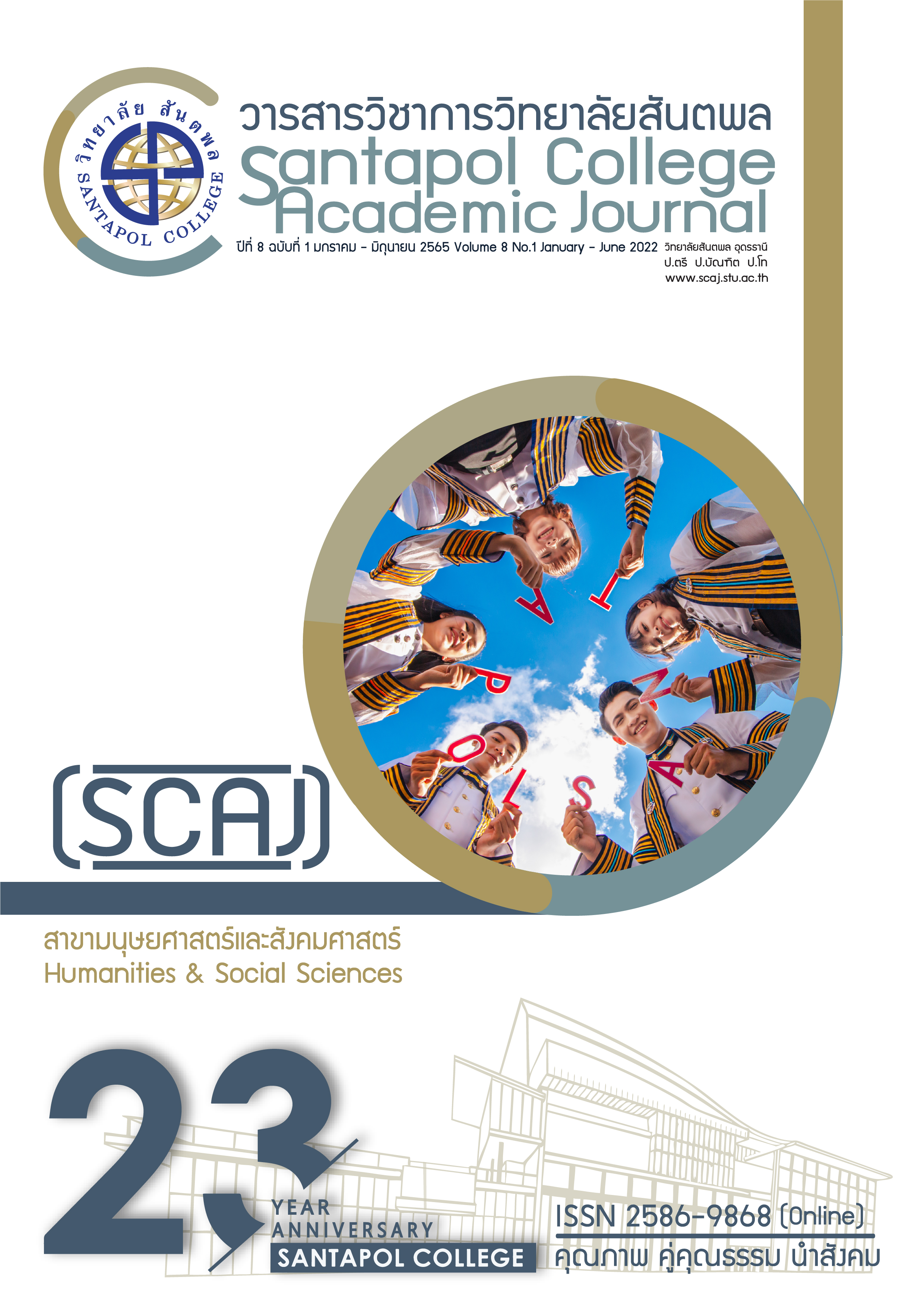FACTORS INFLUENCING PROTECTION COVID-19 TO PEOPLE IN THE COMMUNITY, WANGMOUNG DISTRICT, SARABURI PROVINCE
Main Article Content
บทคัดย่อ
COVID-19 pandemic is a very serious health problem. Infected diabetes mellitus patients have high chances to be fatal. The aims of this research are to examine preventive COVID-19 practices and identify influencing factors protection COVID-19 practices of diabetes mellitus patients in primary care units, Wangmoung district, Saraburi province during the COVID-19 pandemic. A cross-sectional survey study was employed for the research. The sample size was 156 patients from a total of 254 patients who were in all 7 primary care units in Wangmuong district, Saraburi province. The systematic random sampling was conducted to select the samples by choosing from lists of the patients one except one randomly. The questionnaire was tested for validity by 3 experts resulting in IOC valued more than 0.5 and reliability by 30 patients in district hospital with Chronbach’s alpha of 0.84. The data were analyzed by using SPSS. for descriptive statistics, multiple correlation, and linear regression. The research hypothesis was that protection COVID-19 were influenced by knowledge, perception, and stress. The findings were the high preventive COVID-19 practice of patient level and the influencing factors of protection COVID-19 were knowledge, perception, and stress. The suggestion revealed that primary care units should promote COVID-19 to enhance perception and knowledge for preventive COVID-19 practices and relief stress of diabetes mellitus patient.
Article Details

อนุญาตภายใต้เงื่อนไข Creative Commons Attribution-NonCommercial-NoDerivatives 4.0 International License.
เนื้อหาและข้อมูลในบทความที่ลงตีพิมพ์ในวารสารวิชาการวิทยาลัยสันตพล ถือว่าเป็นข้อคิดเห็นและความรับผิดชอบของผู้เขียนบทความโดยตรง ซึ่งกองบรรณาธิการวารสารไม่จำเป็นต้องเห็นด้วยหรือรับผิดชอบใดๆ
เอกสารอ้างอิง
Abdollahi, E., et al. (2020). Simulating the effect of school closure during COVID-19 outbreaks in Ontario, Canada. BMC Med. 18, 230-238.
Ajilore, K., Atakiti, I., Onyenankey, K. (2017). College students’ knowledge, attitudes, and adherence to public service announcements on Ebola in Nigeria: Suggestions for improving future Ebola prevention education programmes. Health Education, 76, 648-660.
Akalu, Y., Ayelign, B., Molla, M.D. (2020). Knowledge, attitude and practice towards COVID-19 among chronic disease patients at Addis Zemen Hospital, Northwest Ethiopia. Infect. Drug Resist., 13, 1949-1960.
Albaqawi, H.M., et al. (2020). Nursing students’ perceptions, knowledge, and preventive behaviors toward COVID-19: A multi-university study. Front. Public health, 8, 254-262.
Aristovnik, A. (2020). Impacts of the COVID-19 Pandemic on Life of Higher Education Students. A Global Perspective. Sustainability, 12, 8438-8472.
Auger, K.A., et al., (2020). Association between statewide school closure and COVID-19 incidence and mortality in the US. JAMA. 324, 859–870.
CDC. (2019). Novel coronavirus, Wuhan, China. https://www.cdc.gov/ coronavirus/2019nCoV/summary.html. Accessed 1 Feb 2020.
Chen, X., et al., (2020). Hand hygiene, mask-wearing behaviors and its associated factors during the COVID-19 epidemic: a cross-sectional study among primary school students in Wuhan, China. Int. J. Environ. Res. Public Health, 17, 2893-2899.
Choi, J.S., Kim, J.S. (2016). Factors influencing preventive behavior against Middle East Respiratory Syndrome-Coronavirus among nursing students in South Korea. Nurse Education Today, 40, 168-172.
Chu, D.K., et al. (2020). Physical distancing, face masks, and eye protection to prevent person-to-person transmission of SARS-CoV-2 and COVID-19: a systematic review and meta-analysis. Lancet. 395, 1973–1987.
Dong, L., Bouey, J., 2020. Public mental health crisis during COVID-19 pandemic, China. Emrging Infect. Dis. 26, 1616–1618.
Ejeh, F.E., et al. (2020). Knowledge, attitude, and practicing among healthcare workers towards COVID-19 outbreak in Nigeria, Heliyon, 6, 50-57.
Espino-Díaz, L., et al. (2020). Analyzing the Impact of COVID-19 on Education Professionals. Toward a Paradigm Shift: ICT and Neuro-education as a Binomial of Action. Sustainability, 12, 646-660.
Fehr, A.R., Channappanavar, R., Perlman, S. (2017). Middle East respiratory syndrome: emergence of a pathogenic human coronavirus. Annu Rev Med, 68, 387–399.
Goh, Y., et al. (2020). The face mask: how a real protection becomes a psychological symbol during Covid-19?. Brain Behav. Immun, 88, 1–5.
Koo, J.R., et al. (2020). Interventions to mitigate early spread of SARS-CoV-2 in Singapore: a modelling study. Lancet Infect. Dis, 20, 678–688.
Li, Q., et al. (2020) Early transmission dynamics in Wuhan, China, of novel coronavirus-infected pneumonia. N Engl J Med, 20(3). 253-264.
Monde, M.D. (2011). The KAP Survey Model (Knowledge, Attitudes and practices). Available online: https://www.springnutrition.org/publications/tools-summaries/kap-survey-model-knowledge-attitudes-and-practices (accessed on 20 November 2021).
Santiparp, P. (2020). The results of health literate promoting program using based on transformative learning via social media for hypertensive/ diabetes mellitus patients. Santapol College Academic Journal, 6(1), 9-18.
Sophia, D.F., Sunny, D.F. (2017). Economic burden of diabetes mellitus and its socioeconomic impact on household expenditure in an urban slum area. Int J Res Med Sci, 5(5), 1808–1813.
Sun, Y., et al. (2020). Disease prevention knowledge, anxiety, and professional identity during COVID-19 pandemic in nursing students in Zhengzhou, China. J. Korean Acad., 50, 533-542.
Szepietowski, J.C., et al. (2020). Face mask-induced itch: a self-questionnaire study of 2,315 responders during the COVID-19 pandemic. Acta Dermato Venereologica, 100, 152-160.
Tawatchai Apidechkul, Pilasinee Wongnuch, Siriyaporn Sittisarn, Thapakorn Ruanja. (2016). Health situation of Akha Hill Tribe in Chiang Rai Province, Thailand. Journal of Public Health and Development, 14(1), 77-97.
Wang, C., et al. (2020). A novel coronavirus outbreak of global health concern. Lancet, 395, 470–473.
Wang, C., et al. (2020). Immediate psychological responses and associated factors during the initial stage of the 2019 coronavirus disease (COVID-19) epidemic among the general population in China. Int. J. Environ. Res. Public Health, 17, 1729-1738.
Wang, L. (2019) The research on crisis management on high school campus based on 4R theory. HeiLongJiang University
WHO. (2017). Fact sheet: Diabetes mellitus. http://www.who.int/mediacentre/factsheets/fs312/en/. Accessed 21 June 2020.
WHO. (2020). Novel Coronavirus–China. https://www.who.int/csr/don/12- january-2020-novel-coronavirus-china/en/. Accessed 21 June 2020.
WHO. (2020). Novel Coronavirus-Japan (ex-China). https://www.who.int/csr/ don/17-january-2020-novel-coronavirus-japan-ex-china/en/. Accessed 21 June 2020.
WHO. (2020). WHO Coronavirus Disease (COVID-19) Dashboard. https://www.who.int/emergencies/diseases/novel-coronavirus-2019. Accessed 21 June 2020.
Wu, J., Bhuyan, S.S., Fu, X. (2020). Enhancing global health engagement in 21st century China. BMJ Glob. Health, 5, 2194-2199.
Zhang, J., et al. (2020). Changes in contact patterns shape the dynamics of the COVID-19 outbreak in China. Science. 368, 1481–1486.
Zhu, N., et al. (2020). A novel coronavirus from patients with pneumonia in China, 2019. N Engl J Med, 20 (1), 54-66.


